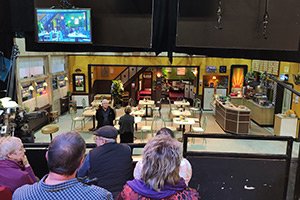Stand-Up Meets Sitcom

Chris Head discusses how stand-up and sitcom cross-pollinate.
In this piece I discuss how building a group of characters around Steve Whiteley's stand-up character Wisebowm enhanced the live shows and also prepared the ground for the forthcoming BBC Radio 4 sitcom pilot. But first a bit about me (as stand-ups say) and a broader look at how stand-up meets sitcom.

I have an agreeable double life. I coach stand-ups, direct shows and have a book out, A Director's Guide to the Art of Stand-up. Meanwhile I teach sitcom writing at Bath Spa University, work one-to-one with writers and I am about to script-edit the aforementioned BBC Radio 4 sitcom pilot. I also deliver coaching and script/pitch consultations with former BBC commissioner / head of comedy at Sky and now TV producer Lucy Lumsden. (Plug: we run an occasional online course on creating, writing and pitching sitcom, plus I run stand-up classes in London throughout the year).
And of course the worlds of stand-up and sitcom do themselves meet. In the States it's common for stand-ups to transition to being at the heart of their own sitcom. The quintessential example being Jerry Seinfeld, and I grew up on Robin Williams as Mork. More recently there's been Roseanne and Ellen, and in the UK there was Jack Dee (and writing partner Pete Sinclair) moving into Dee's first sitcom Lead Balloon. We've also seen Simon Amstell in Grandma's House, Dylan Moran in Black Books, and Miranda too.
While all stand-ups have a persona, an edited and heightened version of themselves ('grumpy Jack Dee' being a great example), some stand-ups perform as entirely fictional characters. Here the leap to sitcom is perhaps more direct; for instance Al Murray's Pub Landlord with his Sky sitcom Time Gentlemen Please. Steve Whiteley's brilliant deluded urban poet Wisebowm is another such stand-up character act.
Steve's early Wisebowm performances consisted of funny intros to disconnected comedy rhymes. When I directed Steve's debut Wisebowm show at the Edinburgh Fringe, I felt we could build a narrative around the rhymes by making Wisebowm the central figure in an ensemble of characters. The show was still a solo performance by Steve, but we gave Wisebowm a group of characters around him that he could talk about and we also heard from some of them in audio snippets. As Steve told me when I interviewed him for my book, "I think that helped me understand who the character was. Once the world started to develop I found it easy to write the material and I had a much clearer focus on who he was. Suddenly the character had this whole world and it was almost like a sitcom."

When working with writers on actual sitcom scripts, I use my character model of boss, striver and fool. I could describe it some length - and I do on my blog - but broadly your sitcom will function better if you have a balance of bosses, strivers and fools. The bosses are the ones in charge (whether it's a work place, a family or group of friends), the strivers are the ones who want to get away and better themselves (and one of them will be your central character) and the fools are well, fools.
When we fleshed out Wisebowm's world in these terms, Wisebowm was our central striver forever trying to break through and become the world's first "urban poet superstar". Steve had already developed the character of Dean, the strangulated, nasal voiced would-be poet who idolises Wisebowm (he naturally became the fool of the piece). Looking for the bosses Steve and I developed the brilliantly named Chevron Niles and his daughter Natalie who run the spoken word club Words On The Street that Wisebowm performs at, seeking that elusive paid headlining spot.

Returning to my model of sitcom characters, the striver can also have a foil, a normal person who the audience can relate to and is effected by their absurd behaviour, gets roped into their ridiculous schemes or who has to lie for them. Polly in Fawlty Towers is a great example. Or, alternatively, they might have a rival. In Blackadder Goes Forth for example the striver Blackadder has a rival in Captain Darling.
Seeking a rival for Wisebowm we hit upon the character of urban poet Katie Storm (a play on Kate Tempest) who is everything Wisebowm wants to be but isn't. Steve ran with this and fleshing out the world in this way greatly enhanced the live show. Then after two Edinburgh shows and Steve's profile increasing on the club circuit, when I introduced radio producer Alan Nixon to Wisebowm he could see the sitcom potential. Not surprising, as we'd been building it live. And I'm happy to report that with Alan's stewardship we have a BBC Radio 4 pilot for a Wisebowm sitcom which I'm script-editing, to be broadcast in summer 2019.
It's a natural step to build a world around a fictional character, but even when the comic is performing as 'themselves' it can still helpful to think about the people around them that populate their world. The stand-up will be the striver, and you're looking to give them bosses, fools, foils and rivals. A lot of them will be versions of real people - their partner, parents and colleagues say.
Sometimes too I suggest developing a fictional character - that feels real to the audience - but who has been made up to fulfil a specific function. For example, I often suggest the stupid or rude friend who can say the stuff the stand-up can't themselves. Whether they're real people, a hybrid of a number of people or a made up person who has a specific role in the stand-up's world, the audience meet all these people when the comic talks about them and we hear from them directly in reported speech and act-outs. This approach can really enhance the live shows and who knows where it might lead.
Chris discusses persona, writing and developing material and full-length festival and touring shows in depth in his book A Director's Guide to the Art of Stand-up. Read Chapter 1 for free and buy from Amazon
Chris also helped develop and teaches on the new BA (Hons) Comedy Degree at Bath Spa University
This article is provided for free as part of BCG Pro.
Subscribe now for exclusive features, insight, learning materials, opportunities and other tools for the British comedy industry.





